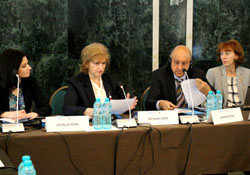Stakeholder workshop on provisional results of the adverse childhood experiences survey in the Republic of Moldova

Youth Friendly Health Center NEOVITA, Moldova
The WHO Regional Office for Europe conducted a technical mission to the Republic of Moldova on 30–31 March 2017 aimed at supporting the Ministry of Health and national counterparts in analysing the data collected from the adverse childhood experiences (ACE) survey and the development of the survey report.
Adverse childhood experiences refer to some of the most intensive and frequently occurring sources of stress that children may suffer early in life. Such experiences include multiple types of abuse; neglect; violence between parents or caregivers; other kinds of serious household dysfunction such as alcohol and substance abuse; and peer, community and collective violence.
During the stakeholder meeting on 30 March 2017, organized jointly by the Ministry of Health and WHO Country Office in the Republic of Moldova, participants representing the health, education and welfare fields and civil society discussed the provisional results of the ACE survey.
The meeting was chaired by Tatiana Zatic, Head of the Primary, Emergency and Community Health Care Department of the Ministry of Health, who emphasized that “it is important to prevent ACEs because they are risk factors that lead to the development of further violence, NCDs [noncommunicable diseases], mental illness and social dysfunction”.
Galina Lesco, Director of the Youth Friendly Health Centre NEOVITA, and principal investigator for the ACE survey, presented the provisional results of the survey, which was conducted among a representative population of 1500 university students. Provisional analysis shows a high prevalence of ACEs among respondents, and increased odds of developing health-harming behaviours associated with such experiences.
Following a vigorous debate, participants recommended that government and civil society put a stronger emphasis on prevention, in particular in development, promotion and support of parenting programmes, including:
- training to prevent shaken-baby syndrome
- violence-free schools
- sexual abuse awareness training in children
- laws to ban corporal punishment
- social marketing campaigns.
The recommended approach would require an intersectoral mechanism, such as a child maltreatment prevention action plan. The group agreed that the preferred next steps would be to disseminate the completed report at a high-level policy dialogue in autumn 2017.



